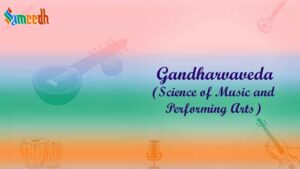Gandharvaveda is the study of music, dance, and other performing arts. It covers the theory and practice of music, including the science of sound, rhythm, melody, and harmony.

Gandharvaveda is one of the Upavedas, traditionally associated with the Samaved, and it focuses on the science of music, dance, and performing arts. The name “Gandharva” refers to celestial musicians and singers in Hindu mythology, who are believed to be the masters of music and melody. The Gandharvaveda encompasses a vast body of knowledge about the theory and practice of music, including vocal music, instrumental music, and dance.
Key Aspects of Gandharvaveda
- Connection with Samaveda: The Samaveda, one of the four main Vedas, is primarily composed of hymns that are meant to be sung. These hymns, known as “Sāman,” are considered the origin of Indian classical music. Gandharvaveda expands on this musical tradition, detailing the principles and practices that guide the creation and performance of music.
- Raga and Tala: Gandharvaveda is believed to be the source of the concepts of Raga (melodic framework) and Tala (rhythmic cycles), which are fundamental to Indian classical music. Ragas are specific combinations of notes that evoke particular emotions or moods, while Talas provide the rhythmic structure for compositions.
- Musical Instruments: Gandharvaveda also covers the construction and use of various musical instruments. This includes string instruments like the Veena, wind instruments like the Flute, and percussion instruments like the Mridangam. The text provides guidelines on how these instruments should be made and played to produce the desired sounds.
- Vocal Music: The science of vocal music, including different types of singing styles, voice modulation, and the correct pronunciation of syllables, is a crucial part of Gandharvaveda. It also discusses the importance of the human voice as the primary instrument in music.
- Dance and Drama: Gandharvaveda includes knowledge about dance and drama, which are considered integral to the performing arts. Dance forms like Bharatanatyam and Odissi, which are deeply connected to Indian classical music, have their roots in the teachings of Gandharvaveda. The text also discusses the importance of facial expressions, gestures, and body movements in conveying emotions and stories through dance.
- Spiritual and Therapeutic Aspects: In addition to its artistic value, Gandharvaveda is believed to have spiritual and therapeutic benefits. Music and dance are seen as means to achieve spiritual elevation and harmony. Certain Ragas are thought to have healing properties and are used in music therapy.
Mythological and Historical Background
In Hindu mythology, the Gandharvas are celestial beings known for their musical abilities, and Gandharvaveda is said to be their domain of expertise. The knowledge of Gandharvaveda was believed to have been passed down from the Gandharvas to human musicians and dancers.
Historically, the principles of Gandharvaveda have influenced the development of Indian classical music and dance. The text laid the foundation for what would become the rich and diverse tradition of Indian performing arts, influencing everything from classical to folk music, and from temple dances to theatrical performances.
Gandharvaveda is often referred to as Maharishi Gandharvaveda in the context of the Maharishi Vedic tradition, particularly associated with Maharishi Mahesh Yogi, the founder of the Transcendental Meditation (TM) movement. This tradition emphasizes the revival and promotion of Vedic knowledge, including the arts and sciences as described in ancient texts.
Legacy
The legacy of Gandharvaveda is evident in the continued prominence of music and dance in Indian culture. The classical music systems of Hindustani (North Indian) and Carnatic (South Indian) music, as well as various dance forms, can trace their origins back to the principles laid out in Gandharvaveda.
Even today, the teachings of Gandharvaveda are studied by musicians, dancers, and scholars who seek to understand and preserve the ancient traditions of Indian performing arts.